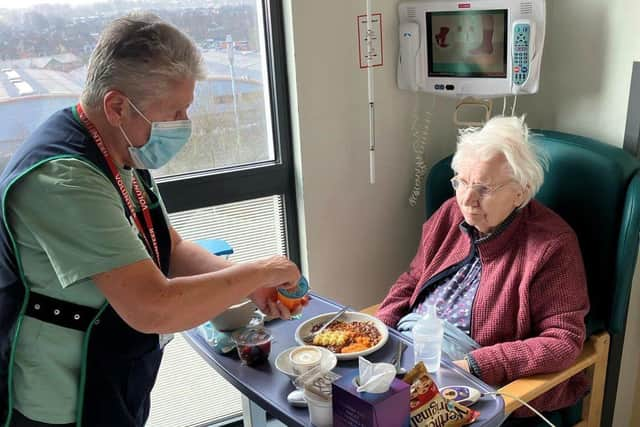Plans to make patient mealtimes matter at Sherwood Forest Hospitals
and live on Freeview channel 276
Sherwood Forest Hospitals Trust has trained 11 volunteers to support patients at mealtimes as part of a six-month trial on two wards at King’s Mill Hospital in Sutton-in-Ashfield.
Following the success of the scheme, more volunteers have been trained ahead of its expansion to more wards, including at Newark Hospital.
Advertisement
Hide AdAdvertisement
Hide AdThe volunteers support and complement Nurses and Healthcare Assistants by making sure that patients’ tables are cleared, their hands are washed, and that they have everything they need within reach to eat and drink.


The level of support each patient needs can vary - some require help with eating and drinking, while others just need a friendly face and words of encouragement - something the volunteers are always on hand to do.
In addition to this, from 11 March, the Trust is shining a light on protected mealtimes on all wards across its three hospital sites – King’s Mill, Newark and Mansfield Community hospitals.
There will be a renewed focus on stopping all non-essential activity on wards between 11.45am and 12.45pm and 4.45pm and 5.45pm each day so patients can enjoy their meals without interruption in a quiet, relaxed atmosphere. This enables nurses and support staff to focus on preparing patients for mealtimes and help them where needed.
Advertisement
Hide AdAdvertisement
Hide AdRelatives who are visiting a patient at mealtimes will be supported and encouraged to assist their loved one. All other interaction between relatives and the nursing/clinical teams will only take place during these times if it’s clinically urgent.
The emphasis on protected mealtimes coincides with the international Nutrition and Hydration Week, which runs from 11 to 17 March.
Chief Nurse Phil Bolton said: “Mealtimes matter because without adequate nutrition the other care we give is less effective. Well-nourished patients are less likely to need long hospital stays or follow-up treatment after they have been discharged, which is what patients, their families and our colleagues are all aiming to achieve.”
Up to 40% of all patients admitted to hospital are undernourished. This figure increases when patients have been in hospital for a week. Malnutrition can lead to delays in patient recovery and increases in the length and frequency of hospital stays.
Advertisement
Hide AdAdvertisement
Hide AdGood nutrition and hydration are important for maintaining good physical and mental health and wellbeing. It is particularly important in a hospital setting, as it can help patients to recover quicker meaning they can return home sooner.
Ann Adams, who has been a volunteer at the Trust for five years, chose to take part in the Mealtime Volunteer scheme because she wanted more interaction with patients.
She said: “We’ve only been doing the project for a few months, but staff say it has been great and helped them a lot, which is encouraging. The patients like to see a different face and someone who is not in a clinical uniform - it’s more personal and friendly. We help people out without making a big deal out of it.”
Emma Dawkins, one of the Trust’s Speech and Language Therapists involved in training the volunteers, said: “The scheme has proved to be a great success so far. We have seen an improvement in the amount our patients are eating and drinking, and morale seems to be a lot higher. Mealtimes can be quite daunting for some patients. Having a friendly face and someone to encourage them and act as a distraction helps.”
Advertisement
Hide AdAdvertisement
Hide AdVisitors are still welcome over mealtimes if they are providing support for the patient to eat or drink. Please avoid calling the ward or your loved one during these times unless it is absolutely necessary.